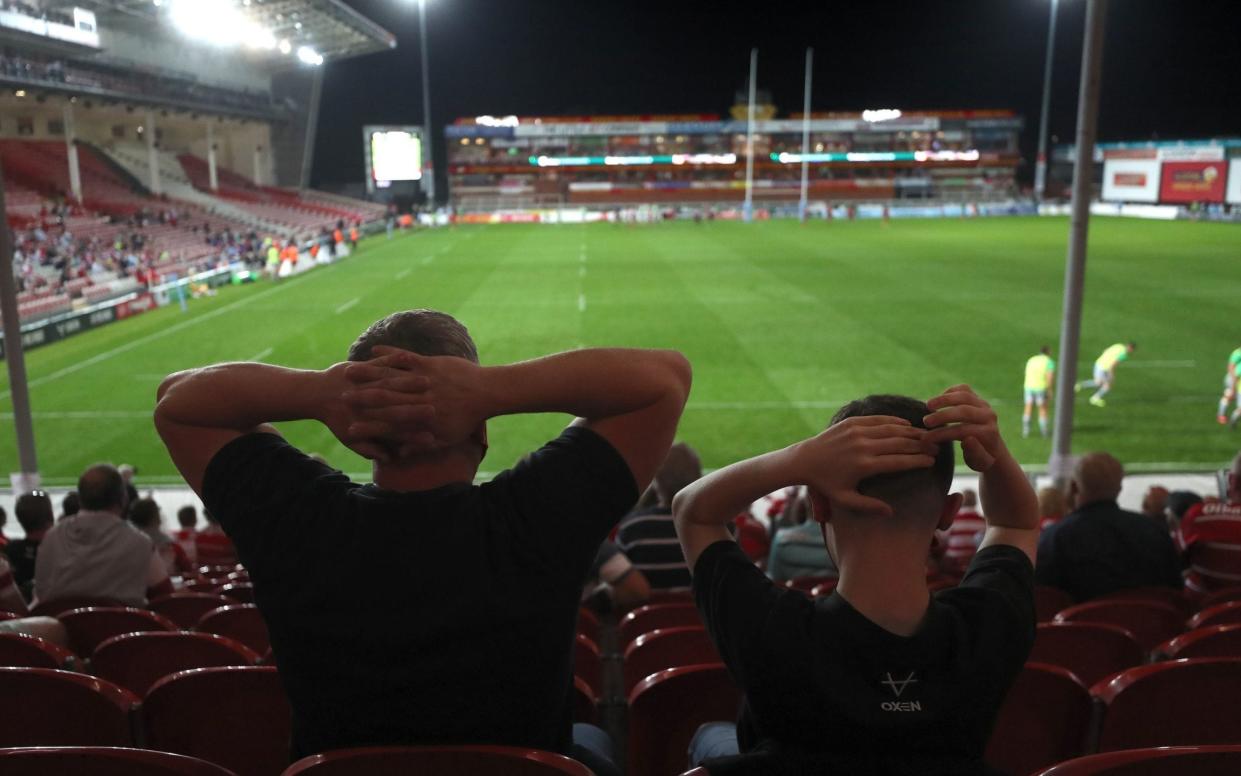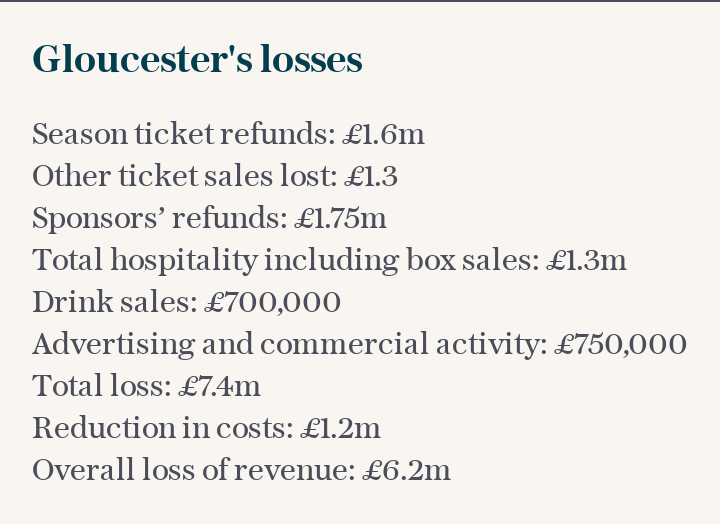Gloucester chief warns club will be out of business in six months without bailout plan

Gloucester have laid bare the extent of the financial crisis gripping English professional rugby, warning that the 147-year old club will go out of business within six months without a government bail-out.
Lance Bradley, Gloucester’s chief executive, has revealed to Telegraph Sport the full details of the financial woes, forecasting that the club will run out of cash before March following a predicted loss of revenue of £6.2 million due to the restrictions imposed by the Covid-19 epidemic.
The dramatic revelations come on another bleak day for the sport, with Peter Tom, the Leicester Tigers chairman, describing the new restrictions on crowds as a “disaster” that “threatens the future of the Premiership”.
Worcester owners Colin Goldring and Jason Whittingham, meanwhile, warned that playing matches behind closed doors for another six months was not “sustainable for this club nor for the Premiership as a whole”.
The chief executives of all the Premiership clubs will hold an emergency conference call on Friday to discuss “the financial Armageddon” facing them, but Premiership Rugby already fears that this week’s decision by the Government to extend the ban on supporters at stadiums until the end of March will lead to combined losses of revenue of £120 million.
The Rugby Football Union has forecast losses of £138 million if no supporters can attend England matches at Twickenham during the autumn series and Six Nations Championship and a further loss of £86 million for the community game. The situation is even bleaker for the Championship clubs, who cannot afford to start their season if supporters are not allowed in. Club owners are to hold a key meeting on Friday, with sources indicating their entire season may have to be “mothballed” – which could leave relegated Saracens stuck in English rugby’s second tier for two years.
Bill Sweeney, the RFU chief executive, and his Premiership Rugby counterpart Darren Childs, met with Oliver Dowden, the Culture Secretary, on Tuesday to make the case for government financial support, and Bradley insists professional rugby in England cannot survive without a bail-out.
“I don’t know if the Government understands how serious this is,” Bradley said. “We have just been through our numbers this morning and the impact of no fans for six months is a loss of £6.2 million.
“The finance people have done the cash-flow forecast and we will run out of money in the next six months. We will not be able to survive with no fans until March, unless there is an intervention. And we are by no means the worst. There are probably half a dozen clubs in more difficult positions than us and they will go out of business, too.
“This is not an awkward situation or one in which we are going to have to trim things a bit. This is the end of the road for professional rugby in this country, if there is no intervention.”
Analysis of Gloucester’s financial peril reveals forecasts that the club will lose £7.4 million in revenue over the next six months, offset by £1.2 million of reduced costs. The club have just spent £35,000 on measures to enable up to 8,000 supporters to attend matches while remaining socially distanced, following a successful pilot in which 1,000 fans attended their match against Harlequins this month.
During the first lockdown, the club furloughed all but seven employees, made up of 150 full-time staff and 200 casuals, while six were made redundant. All staff, including the players, took a pay cut of 25 per cent, but the club still lost £5 million.
“When we went into the lockdown, we had cash reserves of £3 million,” added Bradley. “That was all burned. We had to take loans and the shareholders had to put in a substantial amount as well.
“As a business, rugby was quite fragile before all this and what is so frustrating is that even with the difficulties that we have had, we were on course to start generating cash next year. We had got the business into a much more sustainable state. But we can’t survive a blow of £6.2 million.
“If Gloucester Rugby was to disappear, all the work that we do in the community would also disappear – we do work with homeless people, veterans, underprivileged children and grass roots clubs. The knock-on effect of that is massive.
“The Government can’t let professional sport die in this country – and I don’t believe they will.”
The immediate concern is the future for the players and Bradley admitted he could not rule out the possibility of further salary cuts and a player exodus, if government help was not forthcoming.
“We could be in a position where we have to say to players that we are going to go out of business unless we can agree something,” he said.
“Clearly, we don’t want to do that because we have already cut salaries by 25 per cent. Technically, we would be in breach of contract again and last time we had a number of players who left.
“It would open up the risk of that kind of chaos again. If other countries support their sport or they are in a better position than we are, then there will be another drain of top talent going abroad to the likes of France or Japan.”


 Yahoo News
Yahoo News 
